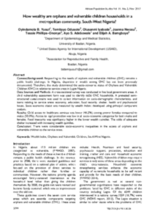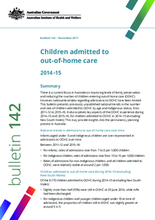Demographic Data
|
Sources: World Bank, UNICEF, UNDP HDR 2015, DHS 2011 |
Displaying 8931 - 8940 of 14391
This study determined the socio-economic status of Orphans and Vulnerable Children (OVC) in relation to service areas in Lagos Nigeria.
This article focuses on the experiences of women who have been resettled in Australia as refugees from Africa, and who have, upon their resettlement, had their children forcibly removed from their care as a result of concerns over child protection.
This document represents the “Evaluation of Government of Moldova - UNICEF 2013-2017 Country Programme of Cooperation (CPC)”. The evaluation was conducted between August 2016 and February 2017.
Child Trends conducted a national survey of state independent living coordinators (Survey on Services and Supports for Young People Transitioning from Foster Care).
This guide represents a methodological support that describes the procedures for the provision, organization and operation of the Family Support Service.
This guide is designed for social workers employed in the social services addressed to families and children in Moldova. In this version, the case management methodology focuses on family strengthening and the development of family’s competences, with the ultimate aim of achieving every child’s well-being.
This article reviews the contribution of psychology to knowledge on child protection and suggests opportunities for psychology to contribute more.
This article explores the mental health outcomes for unaccompanied refugee minors (URM) and offers recommendations for improving psychological wellbeing.
Young unaccompanied asylum seekers have been portrayed as vulnerable, resilient or both. Those granted residency in Europe are offered support by health and social care systems, but once they leave the care system to make independent lives, what part can these services play?
This bulletin presents previously unpublished Australian national trends in the number and rate of children admitted to out-of-home-care by age and Indigenous status, from 2011–12 to 2015–16.






